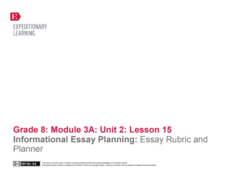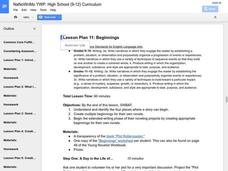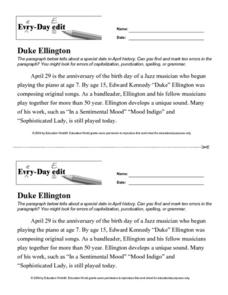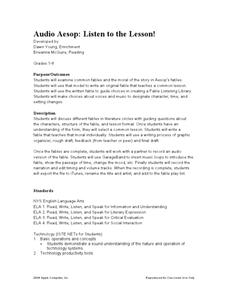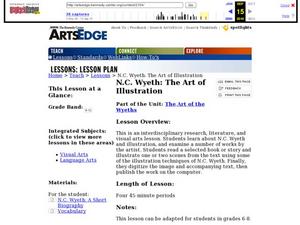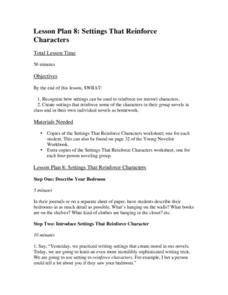Roy Rosenzweig Center for History and New Media
War and Poetry
A band of brothers or the Devil's agents? Nobel warriors freeing the oppressed or mercenaries working for the military/industrial complex? Groups examine poems from the Civil War, World War I, and World War II to determine the poets'...
California Federation of Chaparral Poets, Inc
Poetic Devices
Have everything you need to know about the elements of poetry with a nine-page handout. Split into four categories—word sounds, meanings, arrangement, and imagery—budding poets may reference terms, read definitions, descriptions, and...
EngageNY
Informational Essay Planning: Essay Rubric and Planner
Pupils walk through the process of writing essays for their final assessment of Unbroken. They begin by reviewing the rubric using Rubric Criteria strips that assign a portion of the rubric to each pair of learners. They then participate...
EngageNY
Analyzing a Thematic Concept: Becoming Visible after Captivity
Have some dignity. Readers describe the word dignity using a word web and then sort Louie's actions into categories of reconnecting or dignity with a Visibility Double Arrow graphic organizer. They then use all of their ideas and...
EngageNY
Analyzing an Author’s Craft: Carlotta’s Journey to Justice
Find your voice. Readers look at a passage from A Mighty Long Way and discuss what it means for Carlotta to find her voice. After discussing figurative language and idioms, learners listen to the song "This Little Light of Mine" and...
EngageNY
Language Analysis: “I Have a Dream”
Middle schoolers look closely at Martin Luther King Jr's "I Have a Dream" speech and use a language analysis sheet to determine if King's sentences use active or passive voice. They then move their attention back to A Mighty Long Way to...
Curated OER
ACROSTIC POETRY
Learners use newspapers or magazines to create an acrostic poem where words are divided into parts of speech.
Curated OER
Getting Ready to Write
Young scholars watch an online slideshow that shows Cornelia Funke's transition from an illustrator to a writer. They discuss her writing process from the way she gathers ideas to how and where she writes. Next, they work in groups to...
Curated OER
Come On, Rain!
Students read and analyze the story. For this language arts lesson, students read Come on, Rain! and examine how mood and tone are created, the use of figurative language and the characteristics of the genre. Students research the time...
Curated OER
House and Holmes: A Guide to Deductive and Inductive Reasoning
Test your pupils' reasoning skills with several activities and a quick mystery to solve. Learners watch and analyze a few video clips that demonstrate reasoning in action, practice deduction with an interactive and collaborative...
Teacherfiles
Detective Stationery
Inspire your investigators with fun stationery. On the page is colorful, detective-related clipart, lots of lines for writing, and a space to write in a title.
Curated OER
Lesson Plan 11: Beginnings
Every good novel needs a solid beginning! Setting the stage can have your budding authors stumped, so use this lesson to get them thinking. After examining the plot rollercoaster image (included) they consider the four places their story...
Curated OER
Lesson Plan 17: Novel, Take 2
It's all about using peer resources in this writing process lesson, which includes a fantastic novel revision worksheet packet. Learners have read a partner's story draft the night before, and groups have a "lightning round of praise"...
Education World
Every Day Edit - Duke Ellington
For this everyday editing worksheet, students correct grammatical mistakes in a short paragraph about Duke Ellington. The errors range from capitalization, punctuation, spelling, and grammar.
Curated OER
Write a Short Story
Young scholars compare two paintings, depicting urban life in America in the 1940's, answering a series of questions, then create a short story about the paintings' characters. They compare 'Nighthawks' and 'Nightlife.'
Curated OER
Telling A Story
Students brainstorm all the possible scenarios that would help them tell a story in detail with the whole class and with partners. They create web outlines to create a name story and then illustrate it with creative grammar usage and...
Curated OER
Spelling Exercise: Affect or Effect
Fifteen example sentences need to be completed with either affect or effect. This printable exercise focuses on a discrete skill and could accomplish the mission if your class struggles with this particular distinction. Answer key is...
Road to Grammar
100 Ice-Breaker Questions
What if you could ease your English language learners into class with engaging questions? You can do just that with these questions. The questions, designed to prepare learners for working with English, are grouped by topics, such as...
Curated OER
Keyboarding - Story Grafting
Bring some humor and fun to your keyboarding or language arts class! Middle and high schoolers begin a story in response to a prompt and then move from keyboard to keyboard, continuing to add to the story while the monitor is turned off....
Curated OER
Oliver Twist Goes to Hollywood
How does Oliver Twist, the novel written by Charles Dickens, compare with its screenplay adaptation? Although the activity doesn't require learners to have read the novel, the similarities and differences of the highlighted passages...
Curated OER
Audio Aesop: Listen to the Lesson!
Aesop's Fables are the focus of this language arts lesson. Young philosophers study and discuss the morals found in the most famous of Aesop's Fables. They write an original fable that teaches a common moral. A "Fable Listening Library"...
Curated OER
Art of Illustration: N.C. Wyeth and Literacy
High school artists observe and research the illustrations and techniques of N.C. Wyeth. They read (and reread) stories and illustrate the texts using methods inspired by Wyeth's practice. Includes detailed instructional plan and useful...
Curated OER
Setting the Tone with Figurative Language
Explore figurative language with your secondary class. Extending a language arts unit, the instructional activity prompts middle schoolers to examine how an author's word choice establishes a story's tone, possibly using metaphors,...
Curated OER
Lesson 8: Settings that Reinforce Characters
The best way to be a good writer is to read good writing. Learners read and discuss an excerpt from a book that will help them comprehend the relationship between setting and character. They will use what they've gleaned from discussion...




